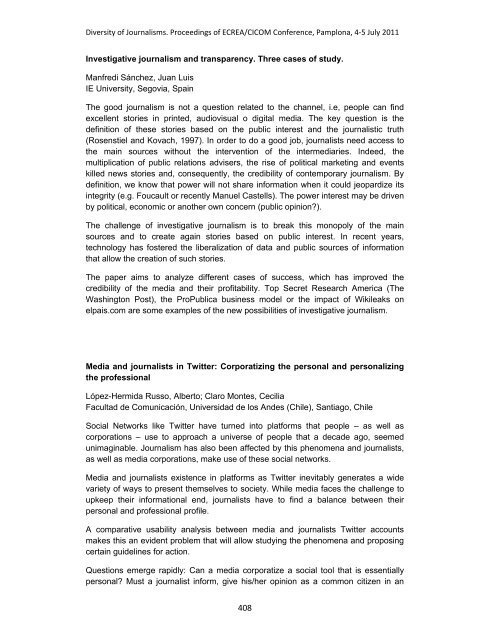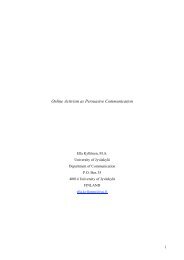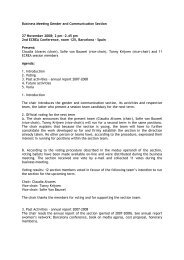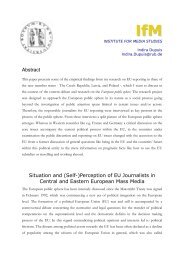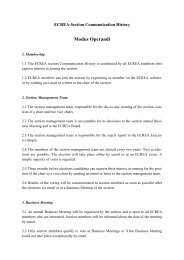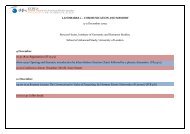- Page 1 and 2:
diversityof journalisms (cicom+ecre
- Page 3 and 4:
Servicio de Publicaciones de la Uni
- Page 5 and 6:
Getting Personal: Personification v
- Page 7 and 8:
Tradition and Innovation in Online
- Page 9 and 10:
Diversity of Journalisms. Proceedin
- Page 11 and 12:
Diversity of Journalisms. Proceedin
- Page 13 and 14:
Diversity of Journalisms. Proceedin
- Page 15 and 16:
Diversity of Journalisms. Proceedin
- Page 17 and 18:
Diversity of Journalisms. Proceedin
- Page 19 and 20:
Diversity of Journalisms. Proceedin
- Page 21 and 22:
Diversity of Journalisms. Proceedin
- Page 23 and 24:
Diversity of Journalisms. Proceedin
- Page 25 and 26:
Diversity of Journalisms. Proceedin
- Page 27 and 28:
Diversity of Journalisms. Proceedin
- Page 29 and 30:
Diversity of Journalisms. Proceedin
- Page 31 and 32:
Diversity of Journalisms. Proceedin
- Page 33 and 34:
Diversity of Journalisms. Proceedin
- Page 35 and 36:
Diversity of Journalisms. Proceedin
- Page 37 and 38:
Diversity of Journalisms. Proceedin
- Page 39 and 40:
Diversity of Journalisms. Proceedin
- Page 41 and 42:
Diversity of Journalisms. Proceedin
- Page 43 and 44:
Diversity of Journalisms. Proceedin
- Page 45 and 46:
Diversity of Journalisms. Proceedin
- Page 47 and 48:
Diversity of Journalisms. Proceedin
- Page 49 and 50:
Diversity of Journalisms. Proceedin
- Page 51 and 52:
Diversity of Journalisms. Proceedin
- Page 53 and 54:
Diversity of Journalisms. Proceedin
- Page 55 and 56:
Diversity of Journalisms. Proceedin
- Page 57 and 58:
Diversity of Journalisms. Proceedin
- Page 59 and 60:
Diversity of Journalisms. Proceedin
- Page 61 and 62:
Diversity of Journalisms. Proceedin
- Page 63 and 64:
Diversity of Journalisms. Proceedin
- Page 65 and 66:
Diversity of Journalisms. Proceedin
- Page 67 and 68:
Diversity of Journalisms. Proceedin
- Page 69 and 70:
Diversity of Journalisms. Proceedin
- Page 71 and 72:
Diversity of Journalisms. Proceedin
- Page 73 and 74:
Diversity of Journalisms. Proceedin
- Page 75 and 76:
Diversity of Journalisms. Proceedin
- Page 77 and 78:
Diversity of Journalisms. Proceedin
- Page 79 and 80:
Diversity of Journalisms. Proceedin
- Page 81 and 82:
Diversity of Journalisms. Proceedin
- Page 83 and 84:
Diversity of Journalisms. Proceedin
- Page 85 and 86:
Diversity of Journalisms. Proceedin
- Page 87 and 88:
Diversity of Journalisms. Proceedin
- Page 89 and 90:
Diversity of Journalisms. Proceedin
- Page 91 and 92:
Diversity of Journalisms. Proceedin
- Page 93 and 94:
Diversity of Journalisms. Proceedin
- Page 95 and 96:
Diversity of Journalisms. Proceedin
- Page 97 and 98:
Diversity of Journalisms. Proceedin
- Page 99 and 100:
Diversity of Journalisms. Proceedin
- Page 101 and 102:
Diversity of Journalisms. Proceedin
- Page 103 and 104:
Diversity of Journalisms. Proceedin
- Page 105 and 106:
Diversity of Journalisms. Proceedin
- Page 107 and 108:
Diversity of Journalisms. Proceedin
- Page 109 and 110:
Diversity of Journalisms. Proceedin
- Page 111 and 112:
Diversity of Journalisms. Proceedin
- Page 113 and 114:
Diversity of Journalisms. Proceedin
- Page 115 and 116:
Diversity of Journalisms. Proceedin
- Page 117 and 118:
Diversity of Journalisms. Proceedin
- Page 119 and 120:
Diversity of Journalisms. Proceedin
- Page 121 and 122:
Diversity of Journalisms. Proceedin
- Page 123 and 124:
Diversity of Journalisms. Proceedin
- Page 125 and 126:
Diversity of Journalisms. Proceedin
- Page 127 and 128:
Diversity of Journalisms. Proceedin
- Page 129 and 130:
Diversity of Journalisms. Proceedin
- Page 131 and 132:
Diversity of Journalisms. Proceedin
- Page 133 and 134:
Diversity of Journalisms. Proceedin
- Page 135 and 136:
Diversity of Journalisms. Proceedin
- Page 137 and 138:
Diversity of Journalisms. Proceedin
- Page 139 and 140:
Diversity of Journalisms. Proceedin
- Page 141 and 142:
Diversity of Journalisms. Proceedin
- Page 143 and 144:
Diversity of Journalisms. Proceedin
- Page 145 and 146:
Diversity of Journalisms. Proceedin
- Page 147 and 148:
Diversity of Journalisms. Proceedin
- Page 149 and 150:
Diversity of Journalisms. Proceedin
- Page 151 and 152:
Diversity of Journalisms. Proceedin
- Page 153 and 154:
Diversity of Journalisms. Proceedin
- Page 155 and 156:
Diversity of Journalisms. Proceedin
- Page 157 and 158:
Diversity of Journalisms. Proceedin
- Page 159 and 160:
Diversity of Journalisms. Proceedin
- Page 161 and 162:
Diversity of Journalisms. Proceedin
- Page 163 and 164:
Diversity of Journalisms. Proceedin
- Page 165 and 166:
Diversity of Journalisms. Proceedin
- Page 167 and 168:
Diversity of Journalisms. Proceedin
- Page 169 and 170:
Diversity of Journalisms. Proceedin
- Page 171 and 172:
Diversity of Journalisms. Proceedin
- Page 173 and 174:
Diversity of Journalisms. Proceedin
- Page 175 and 176:
Diversity of Journalisms. Proceedin
- Page 177 and 178:
Diversity of Journalisms. Proceedin
- Page 179 and 180:
Diversity of Journalisms. Proceedin
- Page 181 and 182:
Diversity of Journalisms. Proceedin
- Page 183 and 184:
Diversity of Journalisms. Proceedin
- Page 185 and 186:
Diversity of Journalisms. Proceedin
- Page 187 and 188:
Diversity of Journalisms. Proceedin
- Page 189 and 190:
Diversity of Journalisms. Proceedin
- Page 191 and 192:
Diversity of Journalisms. Proceedin
- Page 193 and 194:
Diversity of Journalisms. Proceedin
- Page 195 and 196:
Diversity of Journalisms. Proceedin
- Page 197 and 198:
Diversity of Journalisms. Proceedin
- Page 199 and 200:
Diversity of Journalisms. Proceedin
- Page 201 and 202:
Diversity of Journalisms. Proceedin
- Page 203 and 204:
Diversity of Journalisms. Proceedin
- Page 205 and 206:
Diversity of Journalisms. Proceedin
- Page 207 and 208:
Diversity of Journalisms. Proceedin
- Page 209 and 210:
Diversity of Journalisms. Proceedin
- Page 211 and 212:
Diversity of Journalisms. Proceedin
- Page 213 and 214:
Diversity of Journalisms. Proceedin
- Page 215 and 216:
Diversity of Journalisms. Proceedin
- Page 217 and 218:
Diversity of Journalisms. Proceedin
- Page 219 and 220:
Diversity of Journalisms. Proceedin
- Page 221 and 222:
Diversity of Journalisms. Proceedin
- Page 223 and 224:
Diversity of Journalisms. Proceedin
- Page 225 and 226:
Diversity of Journalisms. Proceedin
- Page 227 and 228:
Diversity of Journalisms. Proceedin
- Page 229 and 230:
Diversity of Journalisms. Proceedin
- Page 231 and 232:
Diversity of Journalisms. Proceedin
- Page 233 and 234:
Diversity of Journalisms. Proceedin
- Page 235 and 236:
Diversity of Journalisms. Proceedin
- Page 237 and 238:
Diversity of Journalisms. Proceedin
- Page 239 and 240:
Diversity of Journalisms. Proceedin
- Page 241 and 242:
Diversity of Journalisms. Proceedin
- Page 243 and 244:
Diversity of Journalisms. Proceedin
- Page 245 and 246:
Diversity of Journalisms. Proceedin
- Page 247 and 248:
Diversity of Journalisms. Proceedin
- Page 249 and 250:
Diversity of Journalisms. Proceedin
- Page 251 and 252:
Diversity of Journalisms. Proceedin
- Page 253 and 254:
Diversity of Journalisms. Proceedin
- Page 255 and 256:
Diversity of Journalisms. Proceedin
- Page 257 and 258:
Diversity of Journalisms. Proceedin
- Page 259 and 260:
Diversity of Journalisms. Proceedin
- Page 261 and 262:
Diversity of Journalisms. Proceedin
- Page 263 and 264:
Diversity of Journalisms. Proceedin
- Page 265 and 266:
Diversity of Journalisms. Proceedin
- Page 267 and 268:
Diversity of Journalisms. Proceedin
- Page 269 and 270:
Diversity of Journalisms. Proceedin
- Page 271 and 272:
Diversity of Journalisms. Proceedin
- Page 273 and 274:
Diversity of Journalisms. Proceedin
- Page 275 and 276:
Diversity of Journalisms. Proceedin
- Page 277 and 278:
Diversity of Journalisms. Proceedin
- Page 279 and 280:
Diversity of Journalisms. Proceedin
- Page 281 and 282:
Diversity of Journalisms. Proceedin
- Page 283 and 284:
Diversity of Journalisms. Proceedin
- Page 285 and 286:
Diversity of Journalisms. Proceedin
- Page 287 and 288:
Diversity of Journalisms. Proceedin
- Page 289 and 290:
Diversity of Journalisms. Proceedin
- Page 291 and 292:
Diversity of Journalisms. Proceedin
- Page 293 and 294:
Diversity of Journalisms. Proceedin
- Page 295 and 296:
Diversity of Journalisms. Proceedin
- Page 297 and 298:
Diversity of Journalisms. Proceedin
- Page 299 and 300:
Diversity of Journalisms. Proceedin
- Page 301 and 302:
Diversity of Journalisms. Proceedin
- Page 303 and 304:
Diversity of Journalisms. Proceedin
- Page 305 and 306:
Diversity of Journalisms. Proceedin
- Page 307 and 308:
Diversity of Journalisms. Proceedin
- Page 309 and 310:
Diversity of Journalisms. Proceedin
- Page 311 and 312:
Diversity of Journalisms. Proceedin
- Page 313 and 314:
Diversity of Journalisms. Proceedin
- Page 315 and 316:
Diversity of Journalisms. Proceedin
- Page 317 and 318:
Diversity of Journalisms. Proceedin
- Page 319 and 320:
Diversity of Journalisms. Proceedin
- Page 321 and 322:
Diversity of Journalisms. Proceedin
- Page 323 and 324:
Diversity of Journalisms. Proceedin
- Page 325 and 326:
Diversity of Journalisms. Proceedin
- Page 327 and 328:
Diversity of Journalisms. Proceedin
- Page 329 and 330:
Diversity of Journalisms. Proceedin
- Page 331 and 332:
Diversity of Journalisms. Proceedin
- Page 333 and 334:
Diversity of Journalisms. Proceedin
- Page 335 and 336:
Diversity of Journalisms. Proceedin
- Page 337 and 338:
Diversity of Journalisms. Proceedin
- Page 339 and 340:
Diversity of Journalisms. Proceedin
- Page 341 and 342:
Diversity of Journalisms. Proceedin
- Page 343 and 344:
Diversity of Journalisms. Proceedin
- Page 345 and 346:
Diversity of Journalisms. Proceedin
- Page 347 and 348:
Diversity of Journalisms. Proceedin
- Page 349 and 350:
Diversity of Journalisms. Proceedin
- Page 351 and 352:
Diversity of Journalisms. Proceedin
- Page 353 and 354:
Diversity of Journalisms. Proceedin
- Page 355 and 356:
Diversity of Journalisms. Proceedin
- Page 357 and 358: Diversity of Journalisms. Proceedin
- Page 359 and 360: Diversity of Journalisms. Proceedin
- Page 361 and 362: Diversity of Journalisms. Proceedin
- Page 363 and 364: Diversity of Journalisms. Proceedin
- Page 365 and 366: Diversity of Journalisms. Proceedin
- Page 367 and 368: Diversity of Journalisms. Proceedin
- Page 369 and 370: Diversity of Journalisms. Proceedin
- Page 371 and 372: Diversity of Journalisms. Proceedin
- Page 373 and 374: Diversity of Journalisms. Proceedin
- Page 375 and 376: Diversity of Journalisms. Proceedin
- Page 377 and 378: Diversity of Journalisms. Proceedin
- Page 379 and 380: Diversity of Journalisms. Proceedin
- Page 381 and 382: Diversity of Journalisms. Proceedin
- Page 383 and 384: Diversity of Journalisms. Proceedin
- Page 385 and 386: Diversity of Journalisms. Proceedin
- Page 387 and 388: Diversity of Journalisms. Proceedin
- Page 389 and 390: Diversity of Journalisms. Proceedin
- Page 391 and 392: Diversity of Journalisms. Proceedin
- Page 393 and 394: Diversity of Journalisms. Proceedin
- Page 395 and 396: Diversity of Journalisms. Proceedin
- Page 397 and 398: Diversity of Journalisms. Proceedin
- Page 399 and 400: Diversity of Journalisms. Proceedin
- Page 401 and 402: Diversity of Journalisms. Proceedin
- Page 403 and 404: Diversity of Journalisms. Proceedin
- Page 405 and 406: Diversity of Journalisms. Proceedin
- Page 407: Diversity of Journalisms. Proceedin
- Page 411 and 412: Diversity of Journalisms. Proceedin
- Page 413 and 414: Diversity of Journalisms. Proceedin
- Page 415 and 416: Diversity of Journalisms. Proceedin
- Page 417 and 418: Diversity of Journalisms. Proceedin
- Page 419 and 420: Diversity of Journalisms. Proceedin
- Page 421 and 422: Diversity of Journalisms. Proceedin
- Page 423 and 424: Diversity of Journalisms. Proceedin
- Page 425 and 426: Diversity of Journalisms. Proceedin
- Page 427 and 428: Diversity of Journalisms. Proceedin
- Page 429 and 430: Diversity of Journalisms. Proceedin
- Page 431 and 432: Diversity of Journalisms. Proceedin
- Page 433 and 434: Diversity of Journalisms. Proceedin
- Page 435 and 436: Diversity of Journalisms. Proceedin
- Page 437 and 438: Diversity of Journalisms. Proceedin
- Page 439 and 440: Diversity of Journalisms. Proceedin
- Page 441 and 442: Diversity of Journalisms. Proceedin
- Page 443 and 444: Diversity of Journalisms. Proceedin
- Page 445 and 446: Diversity of Journalisms. Proceedin
- Page 447 and 448: Diversity of Journalisms. Proceedin
- Page 449 and 450: Diversity of Journalisms. Proceedin
- Page 451 and 452: Diversity of Journalisms. Proceedin
- Page 453 and 454: Diversity of Journalisms. Proceedin
- Page 455 and 456: Diversity of Journalisms. Proceedin
- Page 457 and 458: Diversity of Journalisms. Proceedin
- Page 459 and 460:
Diversity of Journalisms. Proceedin
- Page 461 and 462:
Diversity of Journalisms. Proceedin


